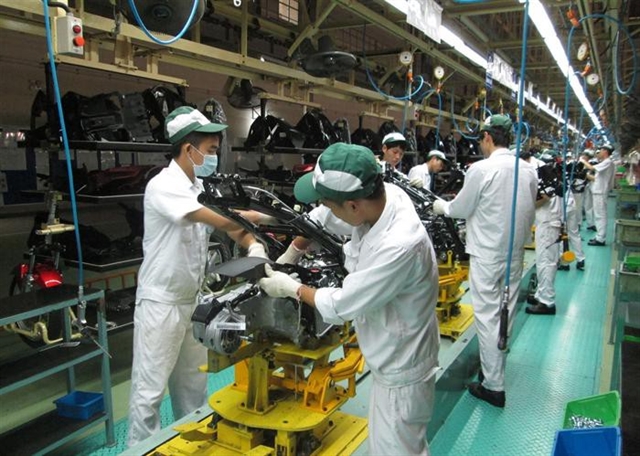 Economy
Economy


|
| COVID-19 caused disruption to Vietnamese manufacturing output in February. — Photo congthuong.vn |
HÀ NỘI — The Vietnam Manufacturing Purchasing Managers' Index (PMI) fell below the 50.0 no-change mark in February, signalling a deterioration in business conditions, a survey of IHS Markit and Nikkei released on Monday showed.
The result represented the first decline for over four years.
According to the latest PMI survey, a key factor behind the deterioration in business conditions was a marked contraction in factory production during February. COVID-19 is blamed to have caused disruption to output, which decreased at the quickest rate since June 2013.
The virus also had a negative impact on demand in February, the survey showed, noting new orders fell for the first time since November 2015, which was partially driven by a reduction in new export sales. Some survey respondents mentioned weaker order flows from China when explaining the fall in international business.
Softer demand conditions led manufacturing firms to cut their purchasing activity midway through the first quarter. The contraction was the first for over four years and historically marked. The result was driven by declines in both the consumer and intermediate goods sub-sectors.
According to the survey, amid fears regarding the spread of coronavirus, employment in the Vietnamese manufacturing sector fell in February. The decrease was the first for four months and the fastest for over six-and-a-half years. Investment goods was the only monitored sub-sector to register an increase in staff numbers.
The coronavirus also adversely affected supply chains in the latest survey period. Vendor performance deteriorated to the greatest extent since June 2014. All three monitored sub-sectors saw slower delivery times.
On the cost front, shortages of necessary inputs led to a rise in cost burdens during February. However, the rate of inflation was softer than that registering in January.
Despite rising input costs, subdued demand led firms to cut average output prices. The decline was the first for three months and modest overall. Investment goods was the only monitored sub-sector to record higher charges.
“Coronavirus has severely hampered the Vietnamese manufacturing sector in February, both on the demand and supply-side. Firstly, a combination of weaker export flows to China and rising domestic fears saw new business decline - the first reduction for over four years. Meanwhile, firms struggled to obtain essential inputs from China amid the disruption, putting upward pressure on input prices. This, coupled with weaker demand and the subsequent reduction to output charges, placed pressure on profit margins,” Eliot Kerr, economist at IHS Markit, said.
However, according to the survey, firms were optimistic towards the 12-month business outlook, supported by expectations for an improvement in demand. However, the degree of confidence weakened to the lowest in series history, dampened by fears of a prolonged impact from COVID-19. — VNS





 Brandinfo
Brandinfo